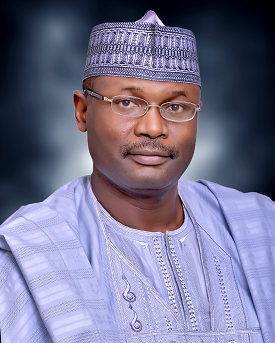The Chairman of the Independent National Electoral Commission (INEC), Prof. Mahmood Yakubu, has called for the urgent establishment of an Electoral Offences Tribunal to ensure swift prosecution of electoral offenders.
Speaking in Abuja at INEC’s first quarterly consultative meeting with the media on Friday, Yakubu lamented the slow pace of justice in electoral cases, warning that delayed prosecutions are undermining Nigeria’s democracy.
He pointed to a recent case in Akwa Ibom State, where a Returning Officer convicted of electoral malpractice took nearly six years to face justice. According to him, such delays embolden election riggers and encourage impunity.
“The recent successful prosecution of a Returning Officer in Akwa Ibom State is a case in point. The Commission has been diligently pursuing the case, which arose from the 2019 General Election,” Yakubu stated. “It took nearly six years to achieve the successful prosecution at the trial court.”
The Need for a Special Tribunal
Yakubu argued that one of the biggest obstacles to combating electoral fraud is the absence of a dedicated court system for such offences. Unlike post-election petitions, which have strict deadlines, electoral crimes linger in regular courts, often overshadowed by other criminal cases.
“A major obstacle to the speedy dispensation of justice in this regard is that electoral offences are not time-bound, as is the case with post-election offences through the tribunals,” he explained. “Furthermore, they are solely prosecuted by the Magistrate and State High Courts in the jurisdiction where the alleged offences are committed.”
He stressed that since these courts handle a wide range of cases, electoral offences do not receive the urgent attention they require. As a result, cases are carried over from one election cycle to another, making it difficult to hold perpetrators accountable.
To address this, Yakubu urged lawmakers and relevant stakeholders to establish an Electoral Offences Tribunal with exclusive jurisdiction and a fixed timeframe to deliver judgments. He also called on the media to support the initiative, saying it would strengthen Nigeria’s democracy and deter electoral fraud.
“It is therefore imperative to renew our call for the creation of the Electoral Offences Tribunal that has a specific jurisdiction and limited timeframe for the speedy dispensation of cases. I urge the media to join in this patriotic advocacy for the good of our electoral democracy,” he stated.
Slow Progress in Prosecutions
Despite the challenges, Yakubu noted that INEC has made some progress in prosecuting electoral offenders, particularly those involved in vote-buying and electoral violence. Through collaborations with the Nigerian Bar Association (NBA) and the Economic and Financial Crimes Commission (EFCC), INEC has filed cases against 774 alleged offenders from the 2023 General Election.
“So far, successful prosecutions have been recorded in Kebbi and Kogi States, while our collaboration with the Economic and Financial Crimes Commission on vote-buying has yielded similar results in Lagos, Kwara, and Gombe States,” he disclosed.
However, Yakubu admitted that many cases remain stuck in the judicial system, reinforcing the need for a specialized tribunal.
Rising Bye-Elections and Electoral Challenges
The INEC Chairman also highlighted the increasing number of bye-elections triggered by legislative vacancies, either due to the deaths of serving lawmakers or absenteeism.
“In the last three weeks alone, vacancies have occurred in one Federal Constituency and two State Constituencies caused by the death of serving members,” Yakubu revealed. “In another State Constituency, the State Assembly declared the seat vacant as a result of absenteeism, following the prolonged absence of the member from sittings of the House in violation of Section 109(1)[f] of the Constitution.”
He assured Nigerians that INEC remains committed to ensuring smooth electoral processes despite these challenges.
Media and Stakeholders Weigh In
Reacting to Yakubu’s remarks, the National Secretary of the Nigerian Union of Journalists (NUJ), Achike Chidi, acknowledged that INEC faces structural and legal constraints in prosecuting electoral offenders.
“If there is one thing I think some of us have noticed, it is the fact that INEC has always been very reluctant when it comes to this pressure on them to prosecute offenders,” Chidi noted. “It is not that they do not want to prosecute offenders. The legal bottlenecks make it difficult.”
He reiterated the need for an Electoral Offences Tribunal, arguing that INEC is already burdened with responsibilities and should focus on conducting elections rather than handling prosecutions.
Chidi also suggested that INEC explore alternative voter identification methods to improve electoral participation. He proposed allowing the use of national identity cards, international passports, and driver’s licenses as valid means of voter identification.
“Perhaps these are also things that they can look at, as they consider other electoral reforms,” he added.
The Way Forward
As Nigeria prepares for future elections, the debate over electoral justice remains a critical issue. The proposed tribunal could mark a significant shift in how electoral crimes are handled, ensuring that offenders face swift consequences.
For now, the ball is in the court of the National Assembly, which has the power to enact laws that will establish the Electoral Offences Tribunal. Until then, electoral offenders may continue to take advantage of a slow judicial system to escape punishment.

